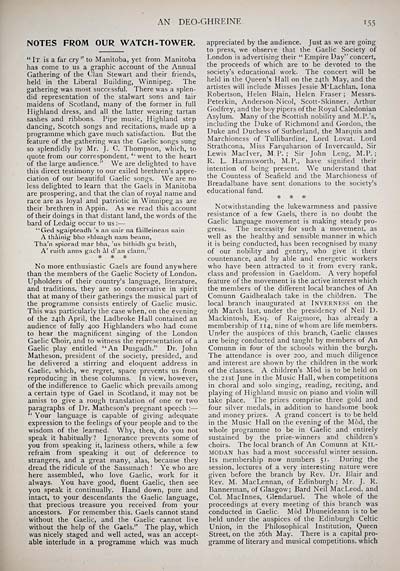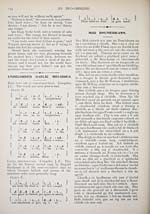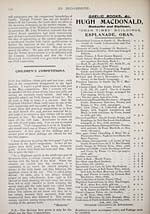Blair Collection > Deo-gréine
(179)
Download files
Complete book:
Individual page:
Thumbnail gallery: Grid view | List view

AN DEO-GHREINE
155
NOTES FROM OUR WATCH-TOWER.
" It is a far cry" to Manitoba, yet from Manitoba
has come to us a graphic account of the Annual
Gathering of the Clan Stewart and their friends,
held in the Liberal Building, Winnipeg. The
gathering was most successful. There was a splen-
did representation of the stalwart sons and fair
maidens of Scotland, many of the former in full
Highland dress, and all the latter wearing tartan
sashes and ribbons. Pipe music, Highland step
dancing, Scotch songs and recitations, made up a
programme which gave much satisfaction. But the
feature of the gathering was the Gaelic songs sung
so splendidly by Mr. J. C. Thompson, which, to
quote from our correspondent, ''went to the heart
of the large audience." We are delighted to have
this direct testimony to our exiled brethren's appre-
ciation of our beautiful Gaelic songs. We are no
less delighted to learn that the Gaels in Manitoba
are prospering, and that the clan of royal name and
race are as loyal and patriotic in Winnipeg as are
their brethren in Appin. As we read this account
of their doings in that distant land, the words of the
bard of Ledaig occur to us : —
"Ged sgaipteadh 's an uair na failleinean uain
A thàinig- bho shluagh nam beann,
Tha'n spiorad mar bha, 'us bithidh gu bràth,
A' ruith amis gach àl d'an clann."
No more enthusiastic Gaels are found anywhere
than the members of the Gaelic Society of London.
Upholders of their country's language, literature,
and traditions, they are so conservative in spirit
that at many of their gatherings the musical part of
the programme consists entirely of Gaelic music.
This was particularly the case when, on the evening
of the 24th April, the Ladbroke Hall contained an
audience of fully 400 Highlanders who had come
to hear the magnificent singing of the London
Gaelic Choir, and to witness the representation of a
Gaelic play entitled "An Dusgadh." Dr. John
Matheson, president of the society, presided, and
he delivered a stirring and eloquent address in
Gaelic, which, we regret, space prevents us from
reproducing in these columns. In view, however,
of the indifference to Gaelic which prevails among
a certain type of Gael in Scotland, it may not be
amiss to give a rough translation of one or two
paragraphs of Dr. Matheson's pregnant speech : —
" Your language is capable of giving adequate
expression to the feelings of your people and to the
wisdom of the learned. Why, then, do you not
speak it habitually? Ignorance prevents some of
you from speaking it, laziness others, while a few
refrain from speaking it out of deference to
strangers, and a great many, alas, because they
dread the ridicule of the Sassunach ! Ye who are
here assembled, who love Gaelic, work for it
always. You have good, fluent Gaelic, then see
you speak it continually. Hand down, pure and
intact, to your descendants the Gaelic language,
that precious treasure you received from your
ancestors. For remember this, Gaels cannot stand
without the Gaelic, and the Gaelic cannot live
without the help of the Gaels." The play, which
was nicely staged and well acted, was an accept-
able interlude in a programme which was much
appreciated by the audience. Just as we are going
to press, we observe that the Gaelic Society of
London is advertising their " Empire Day" concert,
the proceeds of which are to be devoted to the
society's educational work. The concert will be
held in the Queen's Hall on the 24th May, and the
artistes will include Misses Jessie M'Lachlan, Iona
Robertson, Helen Blain, Helen Fraser ; Messrs.
Peterkin, Anderson-Nicol, Scott-Skinner, Arthur
Godfrey, and the boy pipers of the Royal Caledonian
Asylum. Many of the Scottish nobility and M.P.'s,
including the Duke of Richmond and Gordon, the
Duke and Duchess of Sutherland, the Marquis and
Marchioness of Tullibardine, Lord Lovat. Lord
Strathcona, Miss Farquharson of Invercauld, Sir
Lewis Maclver, M.P. ; Sir John Leng, M.P. ;
R. L. Harmsworth, M.P., have signified their
intention of being present. We understand that
the Countess of Seafield and the Marchioness of
Breadalbane have sent donations to the society's
educational fund.
Notwithstanding the lukewarmness and passive
resistance of a few Gaels, there is no doubt the
Gaelic language movement is making steady pro-
gress. The necessity for such a movement, as
well as the healthy and sensible manner in which
it is being conducted, has been recognised by many
of our nobility and gentry, who give it their
countenance, and by able and energetic workers
who have been attracted to it from every rank,
class and profession in Gaeldom. A very hopeful
feature of the movement is the active interest which
the members of the different local branches of An
Comunn Gaidhealach take in the children. The
local branch inaugurated at Inverness on the
9th March last, under the presidency of Neil D.
Mackintosh, Esq. of Raigmore, has already a
membership of 1 14, nine of whom are life members.
Under the auspices of this branch, Gaelic classes
are being conducted and taught by members of An
Comunn in four of the schools within the burgh.
The attendance is over 200, and much diligence
and interest are shown by the children in the work
of the classes. A children's Mod is to be held on
the 21st June in the Music Hall, when competitions
in choral and solo singing, reading, reciting, and
playing of Highland music on piano and violin will
take place. The prizes comprise three gold and
four silver medals, in addition to handsome book
and money prizes. A grand concert is to be held
in the Music Hall on the evening of the Mod, the
whole programme to be in Gaelic and entirely
sustained by the prize-winners and children's
choirs. The local branch of An Comunn at KlL-
MODAN has had a most successful winter session.
Its membership now numbers 51. During the
session, lectures of a very interesting nature were
given before the branch by Rev. Dr. Blair and
Rev. M. MacLennan, of Edinburgh ; Mr. J. R.
Bannerman, of Glasgow; Bard Neil MacLeod, and
Col. Maclnnes, Glendaruel. The whole of the
proceedings at every meeting of this branch was
conducted in Gaelic. Mod Dhuneideann is to be
held under the auspices of the Edinburgh Celtic
Union, in the Philosophical Institution, Queen
Street, on the 26th May. There is a capital pro-
gramme of literary and musical competitions, which
155
NOTES FROM OUR WATCH-TOWER.
" It is a far cry" to Manitoba, yet from Manitoba
has come to us a graphic account of the Annual
Gathering of the Clan Stewart and their friends,
held in the Liberal Building, Winnipeg. The
gathering was most successful. There was a splen-
did representation of the stalwart sons and fair
maidens of Scotland, many of the former in full
Highland dress, and all the latter wearing tartan
sashes and ribbons. Pipe music, Highland step
dancing, Scotch songs and recitations, made up a
programme which gave much satisfaction. But the
feature of the gathering was the Gaelic songs sung
so splendidly by Mr. J. C. Thompson, which, to
quote from our correspondent, ''went to the heart
of the large audience." We are delighted to have
this direct testimony to our exiled brethren's appre-
ciation of our beautiful Gaelic songs. We are no
less delighted to learn that the Gaels in Manitoba
are prospering, and that the clan of royal name and
race are as loyal and patriotic in Winnipeg as are
their brethren in Appin. As we read this account
of their doings in that distant land, the words of the
bard of Ledaig occur to us : —
"Ged sgaipteadh 's an uair na failleinean uain
A thàinig- bho shluagh nam beann,
Tha'n spiorad mar bha, 'us bithidh gu bràth,
A' ruith amis gach àl d'an clann."
No more enthusiastic Gaels are found anywhere
than the members of the Gaelic Society of London.
Upholders of their country's language, literature,
and traditions, they are so conservative in spirit
that at many of their gatherings the musical part of
the programme consists entirely of Gaelic music.
This was particularly the case when, on the evening
of the 24th April, the Ladbroke Hall contained an
audience of fully 400 Highlanders who had come
to hear the magnificent singing of the London
Gaelic Choir, and to witness the representation of a
Gaelic play entitled "An Dusgadh." Dr. John
Matheson, president of the society, presided, and
he delivered a stirring and eloquent address in
Gaelic, which, we regret, space prevents us from
reproducing in these columns. In view, however,
of the indifference to Gaelic which prevails among
a certain type of Gael in Scotland, it may not be
amiss to give a rough translation of one or two
paragraphs of Dr. Matheson's pregnant speech : —
" Your language is capable of giving adequate
expression to the feelings of your people and to the
wisdom of the learned. Why, then, do you not
speak it habitually? Ignorance prevents some of
you from speaking it, laziness others, while a few
refrain from speaking it out of deference to
strangers, and a great many, alas, because they
dread the ridicule of the Sassunach ! Ye who are
here assembled, who love Gaelic, work for it
always. You have good, fluent Gaelic, then see
you speak it continually. Hand down, pure and
intact, to your descendants the Gaelic language,
that precious treasure you received from your
ancestors. For remember this, Gaels cannot stand
without the Gaelic, and the Gaelic cannot live
without the help of the Gaels." The play, which
was nicely staged and well acted, was an accept-
able interlude in a programme which was much
appreciated by the audience. Just as we are going
to press, we observe that the Gaelic Society of
London is advertising their " Empire Day" concert,
the proceeds of which are to be devoted to the
society's educational work. The concert will be
held in the Queen's Hall on the 24th May, and the
artistes will include Misses Jessie M'Lachlan, Iona
Robertson, Helen Blain, Helen Fraser ; Messrs.
Peterkin, Anderson-Nicol, Scott-Skinner, Arthur
Godfrey, and the boy pipers of the Royal Caledonian
Asylum. Many of the Scottish nobility and M.P.'s,
including the Duke of Richmond and Gordon, the
Duke and Duchess of Sutherland, the Marquis and
Marchioness of Tullibardine, Lord Lovat. Lord
Strathcona, Miss Farquharson of Invercauld, Sir
Lewis Maclver, M.P. ; Sir John Leng, M.P. ;
R. L. Harmsworth, M.P., have signified their
intention of being present. We understand that
the Countess of Seafield and the Marchioness of
Breadalbane have sent donations to the society's
educational fund.
Notwithstanding the lukewarmness and passive
resistance of a few Gaels, there is no doubt the
Gaelic language movement is making steady pro-
gress. The necessity for such a movement, as
well as the healthy and sensible manner in which
it is being conducted, has been recognised by many
of our nobility and gentry, who give it their
countenance, and by able and energetic workers
who have been attracted to it from every rank,
class and profession in Gaeldom. A very hopeful
feature of the movement is the active interest which
the members of the different local branches of An
Comunn Gaidhealach take in the children. The
local branch inaugurated at Inverness on the
9th March last, under the presidency of Neil D.
Mackintosh, Esq. of Raigmore, has already a
membership of 1 14, nine of whom are life members.
Under the auspices of this branch, Gaelic classes
are being conducted and taught by members of An
Comunn in four of the schools within the burgh.
The attendance is over 200, and much diligence
and interest are shown by the children in the work
of the classes. A children's Mod is to be held on
the 21st June in the Music Hall, when competitions
in choral and solo singing, reading, reciting, and
playing of Highland music on piano and violin will
take place. The prizes comprise three gold and
four silver medals, in addition to handsome book
and money prizes. A grand concert is to be held
in the Music Hall on the evening of the Mod, the
whole programme to be in Gaelic and entirely
sustained by the prize-winners and children's
choirs. The local branch of An Comunn at KlL-
MODAN has had a most successful winter session.
Its membership now numbers 51. During the
session, lectures of a very interesting nature were
given before the branch by Rev. Dr. Blair and
Rev. M. MacLennan, of Edinburgh ; Mr. J. R.
Bannerman, of Glasgow; Bard Neil MacLeod, and
Col. Maclnnes, Glendaruel. The whole of the
proceedings at every meeting of this branch was
conducted in Gaelic. Mod Dhuneideann is to be
held under the auspices of the Edinburgh Celtic
Union, in the Philosophical Institution, Queen
Street, on the 26th May. There is a capital pro-
gramme of literary and musical competitions, which
Set display mode to: Large image | Transcription
Images and transcriptions on this page, including medium image downloads, may be used under the Creative Commons Attribution 4.0 International Licence unless otherwise stated. ![]()
| Early Gaelic Book Collections > Blair Collection > Deo-gréine > (179) |
|---|
| Permanent URL | https://digital.nls.uk/76699662 |
|---|
| Description | A selection of books from a collection of more than 500 titles, mostly on religious and literary topics. Also includes some material dealing with other Celtic languages and societies. Collection created towards the end of the 19th century by Lady Evelyn Stewart Murray. |
|---|
| Description | Selected items from five 'Special and Named Printed Collections'. Includes books in Gaelic and other Celtic languages, works about the Gaels, their languages, literature, culture and history. |
|---|

